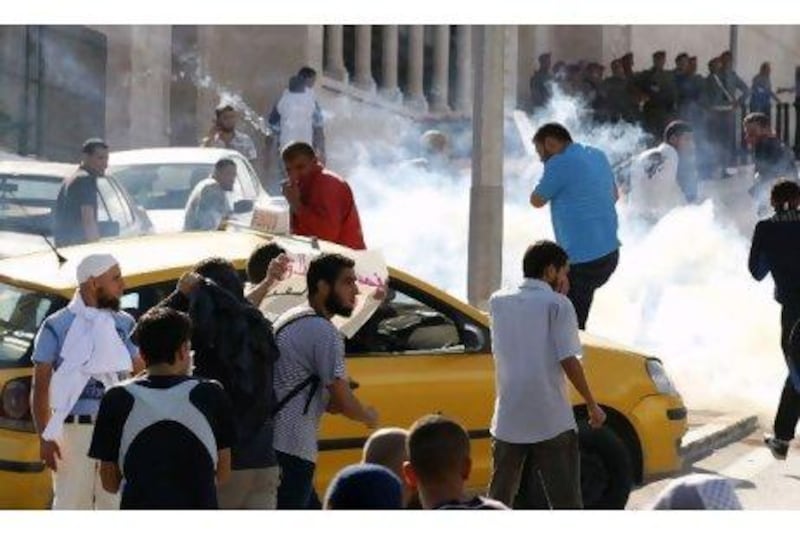TUNIS // Worshippers chanting "Allahu Akbar"; crowds on a motorway under a black flag; vans unloading riot police; young men hurling stones through clouds of tear gas.
Such scenes have rattled the Tunisian capital twice in the past week as protests over a film that some conservative Muslims call blasphemous have degenerated into clashes with the police.
As Tunisians count down to their country's first free elections next week, the violence has raised questions about another fruit of the revolution: freedom of speech.
Protests that drove president Zine El Abidine Ben Ali from power in January inspired uprisings across the Arab world that have toppled some leaders and have challenged others.
Tunisia, meanwhile, has remained for many a test-case in transforming a controlled society into a free one.
"There have been no democratic structures from independence until now," said Seloua Cherfi, a politics and media professor at the University of Tunis. "Now we have freedom of expression. We can expect some confusion, but we cannot accept violence."
For decades Ben Ali and his predecessor, Habib Bourguiba, largely muzzled Tunisia through a vast security apparatus, control of the media, and swift crackdowns on dissent. Conservative Muslims were favoured targets.
Tunisians greeted Ben Ali's departure with an outpouring of self-expression. Facebook pages multiplied, while Tunis's central promenade became a carnival of marches, rallies and impromptu speeches.
However, security forces have since broken up demonstrations in the capital and other cities by critics of the interim government. Often local youths have joined the fray, hurling stones, looting shops and sometimes burning police stations.
Meanwhile, conservative Muslims have emerged after years of persecution by Mr Ben Ali's regime, alarming secularists.
The moderately Islamist Ennahda party was expected to finish first in next week's elections. Interim authorities have blocked the fringe Hizb Attahrir party from politics, while the minority Salafi movement shuns democracy altogether as un-Islamic.
With tensions rising, some Tunisians have been reassessing the merits of unfettered free speech.
"We need freedom of expression. We cannot pass from one dictatorship to another," said Mohammed Abbou, a lawyer jailed for two and a half years for criticising Ben Ali and his family. "However, there must be some limits - for example, on inciting hatred or racism, or gratuitously attacking religious sensibilities."
According to some conservative Muslims, religion came under attack earlier this month when Tunis-based Nessma TV aired Persepolis, an animated film about the 1979 Iranian revolution that contains an image of God.
"Coming from Nessma TV, it was a step too far," said Mondher Abderrahman, an administration committee member at a mosque near Tunis's Al Manar University that is a hub of Tunisia's Salafi movement. "We consider Nessma the mouthpiece of Tunisia's most vehement secularists."
Last Sunday Salafi activists led a protest outside Nessma TV's headquarters that was dispersed by police, while protesters from the Al Manar mosque clashed with police whom they said tried to block them from them from entering an adjacent neighbourhood.
The Ennahda party has condemned the protests while objecting to Persepolis' appearance on Tunisian TV screens.
Meanwhile, a group of lawyers lodged a legal complaint against Nessma TV over Persepolis. Last week Nabil Karoui, the station's owner, publicly apologised for airing the film.
Nevertheless, fresh protests erupted on Friday as worshippers spilt out of mosques after the noon prayer. About 10,000 protesters chanting "Allahu Akbar" gathered outside the prime minister's office demanding Islamic law, reported Reuters news agency. Scuffles broke out, police fired tear-gas and protesters fled into surrounding streets, with some throwing stones.
By early Friday afternoon, groups of protesters, police and youths armed with stones were roaming Tunis, clashing sporadically.
Police fired tear-gas to disperse several dozen protesters flying the black flag of Hizb Attahrir outside an office of Tunisie Telecom. Within minutes the police were ducking a barrage of stones from youths massed down a side-street.
On a hill above the prime minister's office at the edge of Tunis's old city, young men wearing beards and white robes were marching down a motorway when a sudden volley of police tear-gas scattered them.
The interior ministry said that 15 police officers were injured during Friday's clashes and several young people were arrested. Police seized several petrol bombs from protesters, the ministry said.
On Friday evening about 100 people converged on Mr Karoui's home, breaking windows and attempting to set it alight, Reuters said, citing Mr Karoui.
For Mr Abbou, the row over Persepolis illustrates the unintended consequences of free speech: neither the film's airing nor the protests it provoked would likely have been tolerated by Ben Ali's regime, he said. Despite such complications, "I don't see freedom of expression in danger," he said. "We all lived through Ben Ali, and nobody wants to go back."






